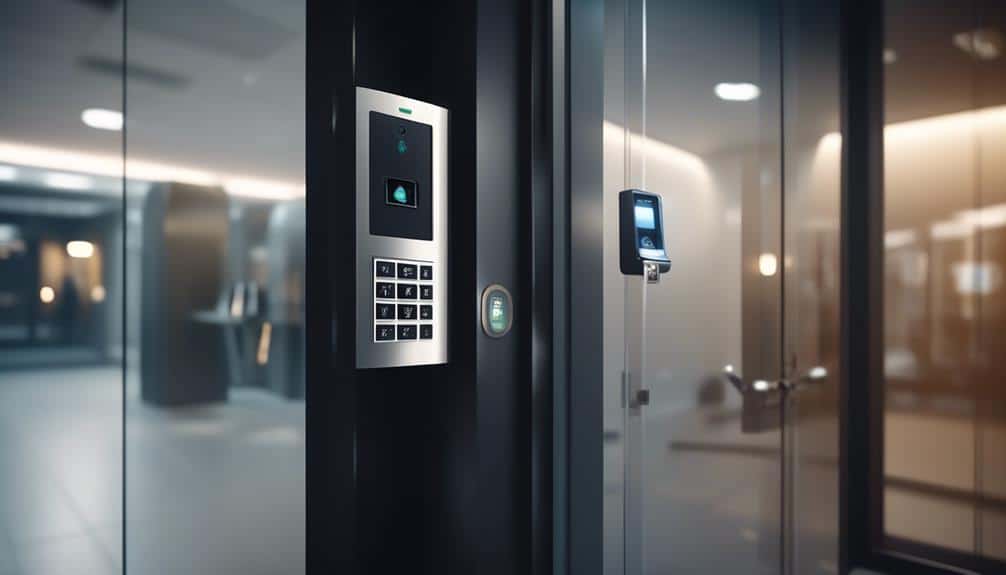When it comes to securing commercial properties, one may argue that traditional key systems are sufficient.
However, in today's ever-evolving world of security, it is essential to explore more advanced options.
That's why we've compiled a list of the 7 best commercial property key systems that offer enhanced security and convenience.
From master key systems to biometric key systems, each option provides unique features and benefits that cater to different business needs.
So, whether you're looking for electronic keyless entry systems or high-security key systems, this discussion will unveil the key to safeguarding your commercial property.
Traditional Key Systems

Traditional key systems have long been the go-to method for securing commercial properties. These systems involve physical keys that are distributed to authorized personnel for access to different areas of the property. Traditional key management is the process of ensuring that keys are properly organized, tracked, and accounted for. This includes keeping records of who's which keys and implementing procedures for key distribution, return, and replacement.
One of the challenges of traditional key systems is the risk of key duplication. Unauthorized duplication of keys can compromise the security of a commercial property, as it allows unauthorized individuals to gain access. To address this concern, key duplication services are often provided by locksmiths or other specialized key services. These services can help ensure that only authorized individuals have access to key duplication, reducing the risk of unauthorized key copies.
While traditional key systems have been widely used, they do have limitations. Key management can be time-consuming and prone to errors, especially in larger commercial properties with many keys and personnel. Additionally, if a key is lost or stolen, it can be costly and inconvenient to rekey or replace the affected locks.
Master Key Systems
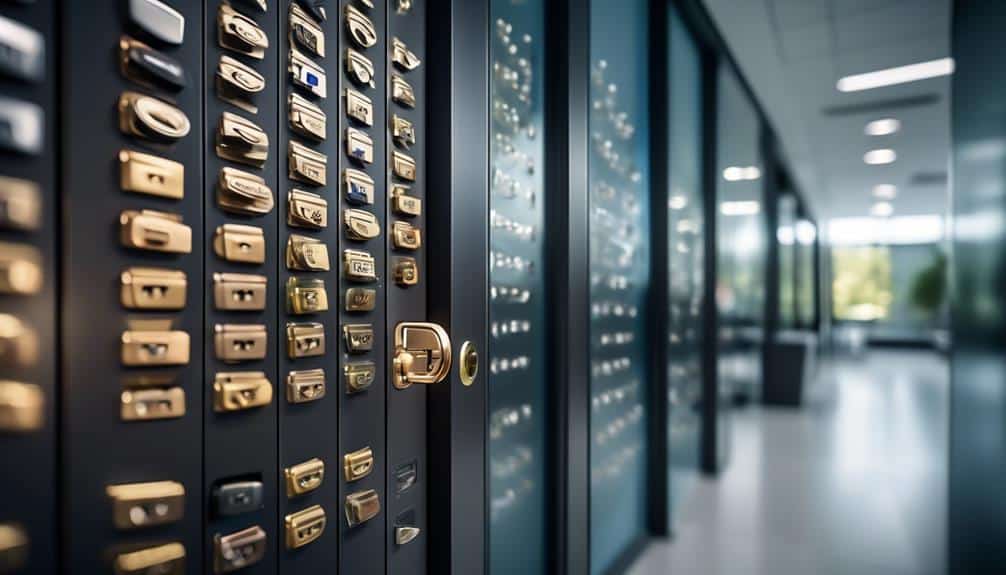
Master key systems offer a range of benefits for commercial property owners and managers.
With a master key system, you can easily manage access to different areas of your property, allowing for efficient control and monitoring.
Additionally, implementing a master key system can provide key management solutions, ensuring that keys are organized and accounted for.
Benefits of Master Keys
Using a master key system can provide numerous advantages for managing access to commercial properties. This system allows for efficient and controlled entry, reducing the need for multiple keys and ensuring the security of the premises. Here are some key benefits of using a master key system:
| Advantages | Applications | Benefits |
|---|---|---|
| 1. Enhanced security | Ideal for multi-tenant buildings | Prevents unauthorized access |
| 2. Convenience | Suitable for large complexes | Easy access for property management |
| 3. Flexibility | Perfect for restricted areas | Allows selective access for different users |
| 4. Cost-effective | Ideal for businesses with high staff turnover | Eliminates the need for frequent key changes |
Key Management Solutions
To effectively manage access to commercial properties and maximize security, it's crucial to implement robust key management solutions that streamline entry and ensure the protection of the premises. Key management software and key tracking software are essential tools for maintaining control over your property's keys.
Here are three key benefits of using these solutions:
- Improved organization: Key management software allows for easy tracking and monitoring of keys, ensuring that they're accounted for at all times. This eliminates the risk of misplaced or lost keys, saving time and reducing security vulnerabilities.
- Enhanced security: With key management software, you can restrict access to specific individuals and track who's accessed certain areas. This helps prevent unauthorized entry and provides an audit trail in case of incidents.
- Increased efficiency: Key tracking software simplifies the process of assigning and returning keys, reducing administrative burden and streamlining operations.
Implementing Master Key Systems
Implementing master key systems can greatly enhance the security and efficiency of access management in commercial properties.
However, it's important to be aware of the implementation challenges that may arise during the process.
One of the main challenges is ensuring that the system is customized to meet the specific needs of the property. This involves carefully considering factors such as the number of doors, the types of locks, and the hierarchy of access levels.
Additionally, key system customization requires expert knowledge and experience to ensure that the system is designed and implemented correctly. It's important to work with a reputable locksmith or security professional who can provide guidance and support throughout the implementation process.
Electronic Keyless Entry Systems
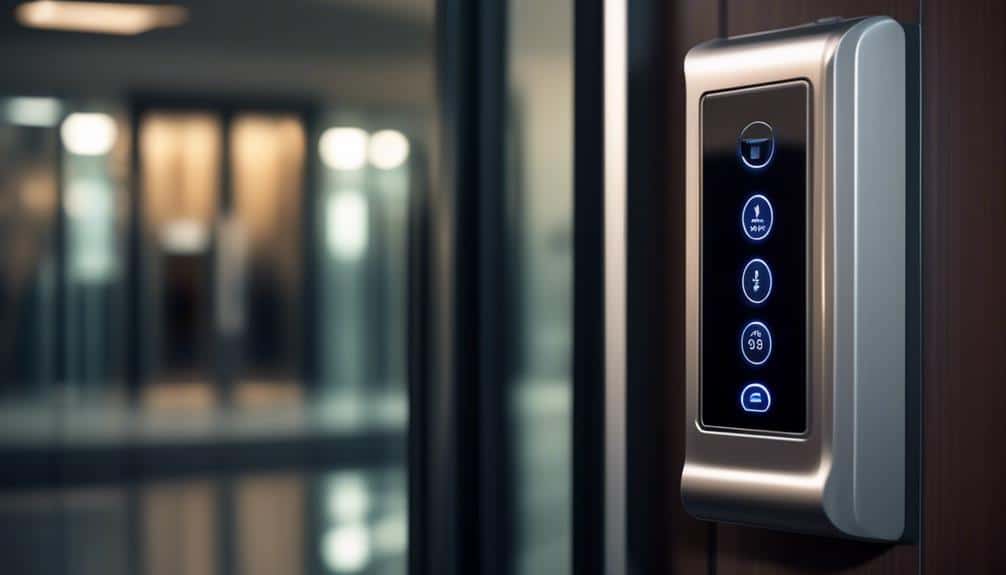
Electronic keyless entry systems offer numerous benefits for commercial properties. They provide convenience and ease of access, eliminating the need for traditional keys. Some of the top electronic keyless systems include keypad entry, biometric scanners, and proximity cards.
Additionally, these systems can be seamlessly integrated with security systems, ensuring a comprehensive and efficient approach to commercial property access control.
Benefits of Electronic Keyless Entry
Using electronic keyless entry systems offers numerous benefits for commercial property owners and managers.
- Enhanced Security: Electronic keyless entry systems provide a higher level of security compared to traditional lock and key systems. With keyless entry technology, access can be granted or revoked instantly, reducing the risk of unauthorized entry and ensuring that only authorized personnel have access to the property.
- Convenience and Flexibility: Electronic keyless entry systems eliminate the need for physical keys, making it easier for property owners and managers to manage access. Access codes or keycards can be easily issued or deactivated, and temporary access can be granted for contractors or visitors.
- Audit Trail: Electronic keyless entry systems provide an audit trail of who entered or exited the property and at what time. This helps in monitoring and tracking access, ensuring accountability, and investigating any security incidents.
Top Electronic Keyless Systems
When it comes to securing commercial properties, there are several top electronic keyless systems that offer enhanced security and convenience.
One of the top smart locks in the market is the keyless access control system, which eliminates the need for physical keys and allows users to unlock doors using a code or smartphone app. This system offers advanced security features such as biometric authentication, remote access control, and real-time monitoring.
Another popular electronic keyless system is the keypad entry system, which requires users to enter a unique code to gain access. This system is easy to use and manage, allowing property owners to assign and revoke access codes as needed.
Integration With Security Systems
Integration with security systems enhances the effectiveness and efficiency of electronic keyless entry systems in securing commercial properties.
By integrating with surveillance systems, electronic keyless entry systems can provide real-time video monitoring of access points, allowing property managers to visually verify the identity of individuals attempting to enter.
This integration also enables the system to automatically record video footage whenever a door is accessed, providing valuable evidence in the event of a security breach.
Additionally, integration with alarm systems allows electronic keyless entry systems to trigger alarms or notifications if unauthorized access is detected, alerting security personnel and enabling immediate response.
Biometric Key Systems
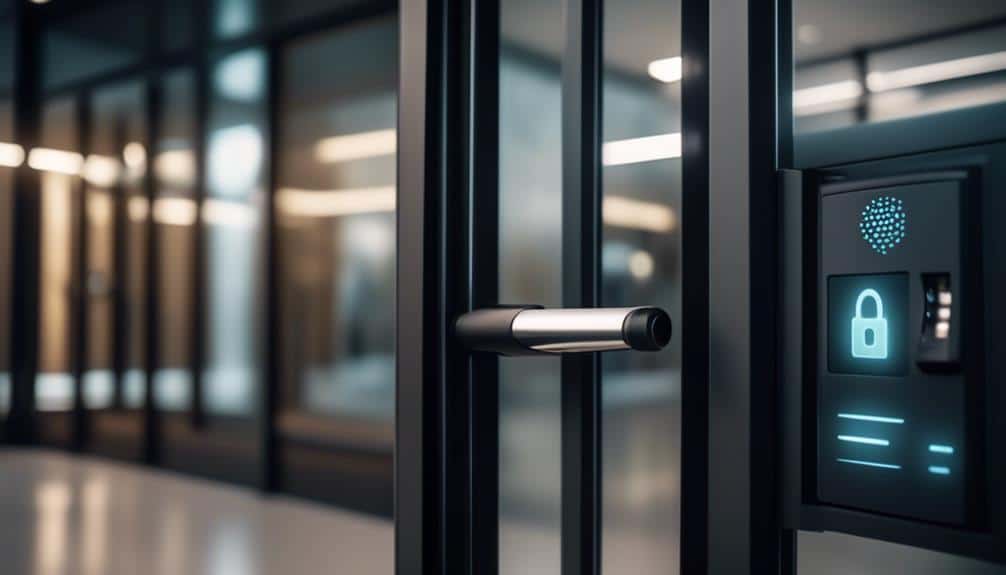
Biometric key systems offer a secure and efficient way to access commercial properties using unique physical characteristics. These systems use biometric data, such as fingerprints, iris scans, or facial recognition, to authenticate users and grant access. One of the key advantages of biometric key systems is their high level of security. Unlike traditional keys or access cards, biometric data is unique to each individual and can't be easily duplicated or stolen. This significantly reduces the risk of unauthorized access to commercial properties.
Biometric key systems also provide convenience and efficiency. With biometric authentication, there's no need to carry physical keys or remember complex access codes. Users simply need to present their biometric data, and the system will grant access if the data matches the stored information.
However, implementing biometric key systems can come with its challenges. One challenge is the cost of installation and maintenance. Biometric key systems require specialized hardware and software, which can be expensive to acquire and maintain. Additionally, integrating biometric systems with existing security infrastructure can be complex and time-consuming.
Despite these challenges, the advantages of biometric key systems make them an attractive option for commercial property owners who prioritize security and efficiency. These systems offer a reliable and convenient way to control access to commercial properties while minimizing the risk of unauthorized entry.
Restricted Key Systems
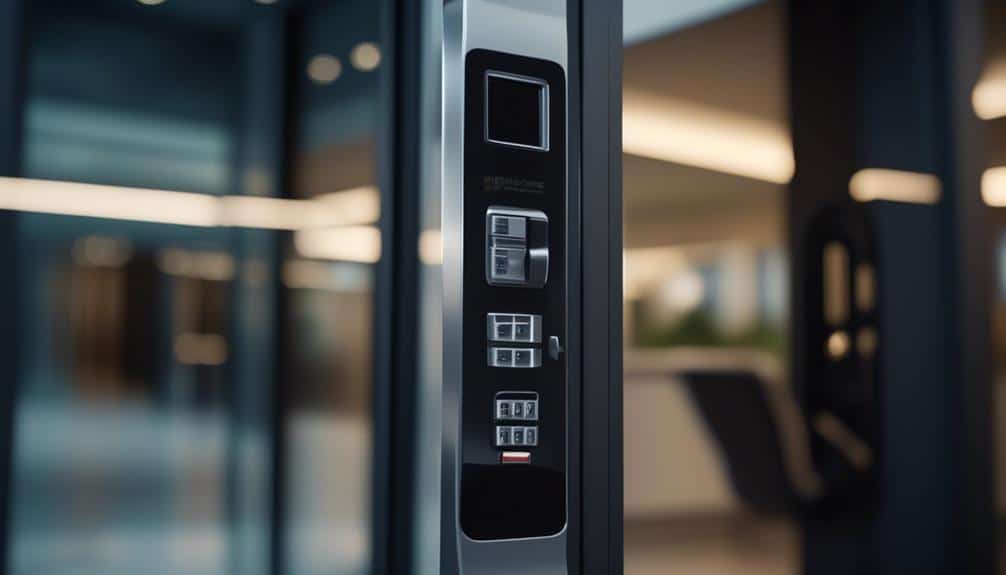
Restricted key systems provide enhanced security and control over access to commercial properties. These systems are designed to prevent unauthorized duplication of keys and ensure that only authorized individuals can gain entry.
Here are three key benefits of implementing a restricted key system:
- Enhanced Key Control: Restricted key systems use unique keys that can't be easily duplicated. This helps to prevent unauthorized individuals from obtaining copies of keys and gaining access to the property. By limiting the number of key copies and implementing strict key control measures, businesses can maintain better control over their property and reduce the risk of unauthorized entry.
- Increased Security: Restricted key systems offer a higher level of security compared to standard key systems. The keys are usually designed with intricate keyways and complex key cuts, making them difficult to duplicate without proper authorization. This makes it harder for criminals to create unauthorized copies and gain access to the property.
- Reduced Risk of Key Duplication: With restricted key systems, businesses have greater control over who can duplicate keys. Key blanks and duplication services are often restricted to authorized individuals or locksmiths. This reduces the risk of key duplication by unauthorized individuals, protecting the security of the property.
Implementing a restricted key system can greatly enhance the security of commercial properties by preventing unauthorized key duplication and ensuring strict key control measures are in place.
Key Card Access Systems
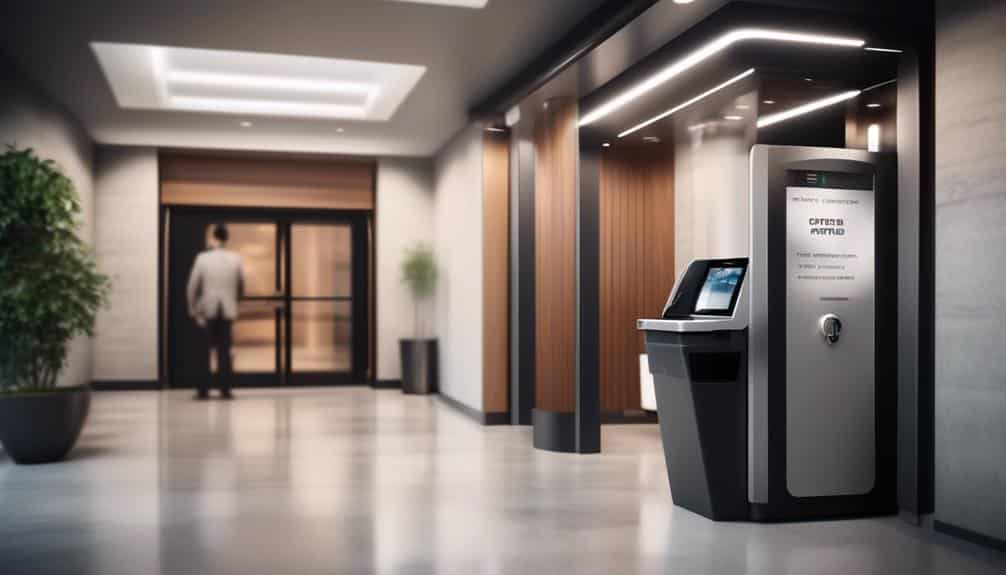
Key card access systems offer a convenient and secure way for authorized individuals to gain entry to commercial properties. These systems have become increasingly popular due to their ease of use and enhanced security features. Keyless entry options provided by key card access systems eliminate the need for traditional keys, reducing the risk of unauthorized access and the hassle of replacing lost or stolen keys.
Key card security is a critical aspect of these systems. The cards themselves are often equipped with advanced technology, such as magnetic stripes or proximity chips, that store encrypted information. This information is then transmitted to a central control panel that verifies the card's authenticity and grants or denies access accordingly. Additionally, key card access systems allow for quick and easy deactivation of lost or stolen cards, mitigating the risk of unauthorized entry.
Furthermore, key card access systems can be integrated with other security measures, such as video surveillance or alarm systems, to provide a comprehensive security solution for commercial properties. This integration enhances the overall security of the property and allows for better monitoring and control.
High-Security Key Systems
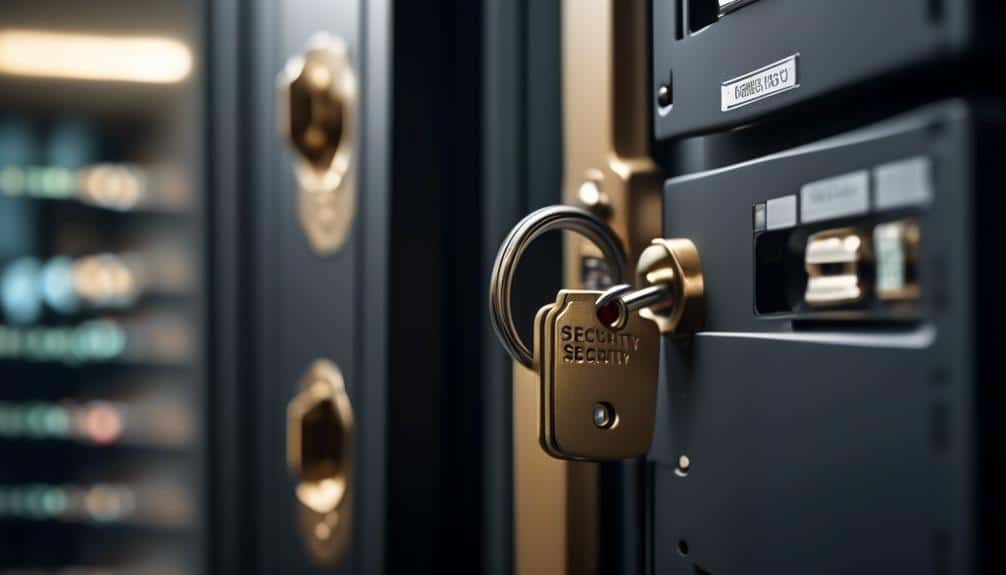
With an increasing emphasis on security, commercial properties are turning to high-security key systems to ensure the utmost protection for their premises. These advanced lock systems provide an extra layer of security and offer better key control, reducing the risk of unauthorized access.
When it comes to high-security key systems, there are several options available in the market. Here are three popular choices:
- Restricted Key Systems: These systems use specially designed keys that are difficult to duplicate. They offer greater control over key distribution and can only be duplicated by authorized locksmiths.
- Biometric Lock Systems: These systems use fingerprint or iris recognition technology to grant access. They provide a high level of security as they rely on unique biological traits that are difficult to replicate.
- Electronic Key Control Systems: These systems use electronic keys that can be programmed with specific access permissions. They offer real-time monitoring and auditing capabilities, providing detailed information about key usage.
Implementing high-security key systems not only helps protect commercial properties from break-ins and theft but also ensures that sensitive areas are accessible only to authorized individuals. By investing in these advanced lock systems, businesses can enhance their overall security measures and have better control over who has access to their premises.
Frequently Asked Questions
How Do I Choose the Best Commercial Property Key System for My Specific Business Needs?
When choosing a commercial property key system for our specific business needs, we consider commercial property key system reviews and key features.
It's important to evaluate the security features, scalability, ease of use, and integration capabilities.
We also consider the ability to manage access levels and generate audit trails.
Additionally, we take into account the reputation and customer support of the key system provider.
Are There Any Legal Requirements or Regulations That I Need to Consider When Implementing a Commercial Property Key System?
When considering the implementation of a commercial property key system, there are important legal considerations and regulations that we need to take into account. These may vary depending on the jurisdiction and industry.
It's crucial to comply with relevant laws such as data protection and privacy regulations. Additionally, there may be specific requirements for key management and access control systems.
Understanding these legal requirements can help us navigate implementation challenges and ensure a secure and compliant key system for our business.
Can I Integrate the Commercial Property Key System With Other Security Systems, Such as Surveillance Cameras or Alarm Systems?
Yes, you can integrate the commercial property key system with other security systems such as surveillance cameras and alarm systems.
Integrating key systems with access control allows for a more comprehensive security solution.
The benefits of integrating key systems with surveillance cameras include enhanced monitoring and recording capabilities, enabling you to have a complete view of who enters and exits your property.
This integration can provide valuable data for security analysis and investigations, making your commercial property more secure.
What Are the Maintenance and Servicing Requirements for Different Types of Commercial Property Key Systems?
Maintenance and servicing requirements for different types of commercial property key systems can vary.
It's important to regularly inspect and clean the key system components to ensure smooth operation. Some systems may require lubrication or replacement of worn out parts.
Additionally, routine testing and calibration may be necessary to maintain optimal functionality. It's recommended to consult the manufacturer's guidelines and schedule regular maintenance with a qualified technician to keep the key system in top condition.
Are There Any Limitations or Potential Vulnerabilities Associated With Each Type of Commercial Property Key System That I Should Be Aware Of?
There are potential vulnerabilities, limitations, and risks associated with each type of commercial property key system that we should be aware of.
These can include the risk of unauthorized access, the limitations of physical keys or cards being lost or stolen, and the potential vulnerability of electronic key systems to hacking or technological malfunctions.
It's important to carefully consider these factors when choosing a key system for commercial properties to ensure the security and safety of the premises.

